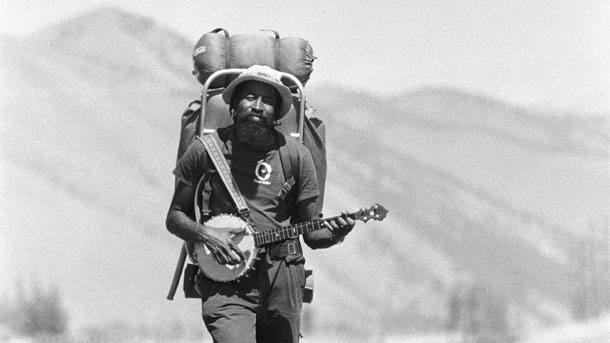From the Archives.
Some weeks ago, a friend sent me the link to an amazing video.
John Francis, known as the PlanetWalker, became an environmentalist after seeing 2 oil tankers collide under the Golden Gate Bridge in 1971, spilling more than a half-million gallons of oil.
Francis saw the oozing sludge, witnessed the birds and wildlife dying.
In response, he gave up driving or riding in a car or indeed any motorised vehicle.
Arguing with friends about what he was doing and whether one man could make a difference was exhausting, so he stopped talking too.
Picking up his banjo, he started walking in silence.
A 17 Year Journey
What started out as a one day protest became one year, then finally seventeen years.
In the external silence, the internal voices started to go quiet and he got to hear what was truly important to him beneath the babble.
Interspersed with walking across the US, Francis educated himself and started teaching – all without using his voice.
Francis became the voice of environmentalism
Francis found himself in Washington writing oil pollution regulations. Finally, he was writing about something close to his heart.
Speaking at TED in 2008, he shared his story as well as the personal insights that led to questioning and redefining himself along the way.
John Francis’ story really touched me. He had the courage of his convictions. He truly believed that one man could make a difference and he set out to prove it.
What can we learn?
While we don’t need to go to that extreme, we can learn or be reminded of some important lessons through his message:
- If we are silent, we can actually hear that noisy voice in our head telling us what to do, what not to do, judging ourselves and judging others. That voice is there most of the time, talking to us, and we just don’t notice it. If the voice is supporting and encouraging us, great. Most commonly, though, it is reinforcing self-imposed limitations. Turn down the volume! Change the subject. Paying attention to something else that is positive cuts off the oxygen for a negative loop. After a while of not “feeding” the voice in our heads, it goes away. Those of us who meditate have experienced the peace that comes in place of the voice.
- In the ensuing silence, Francis was able to question how he perceived himself as a human being and a black man, and question his unconscious responses. He recognised that too often our conversations aren’t genuine connection. One person is talking and the other person is busy forumulating his or her response, having reached a premature conclusion about the message the other person is communicating. I’ve certainly been guilty of that and Im sure you have too. We can break the pattern and we don’t have to be silent for 17 years to do that.
- Having identified what was important to him, he had the courage to live by his convictions. All it took for Francis was 17 years of silence and a pilgrimage across the US (many times) He wound up at University of Wisconsin where he spent 2 years writing about oil spills. Nobody was interested until the wreck of the Exxon Valdez in March 1989. Francis was named as the Environmental Ambassador for the U.S. At the inaugural World Earth Day on April 22, 1990, Francis finally spoke. After inspiring people he encountered over his 17 years of silence, he was finally putting practical solutions in place.
The question for us is: “What do we need to do in order to see who we really are, what is important to us and to speak our truth?” I can assure you, it’s not necessarily easy and it is always worthwhile.
What do you think? I’d love to hear.


